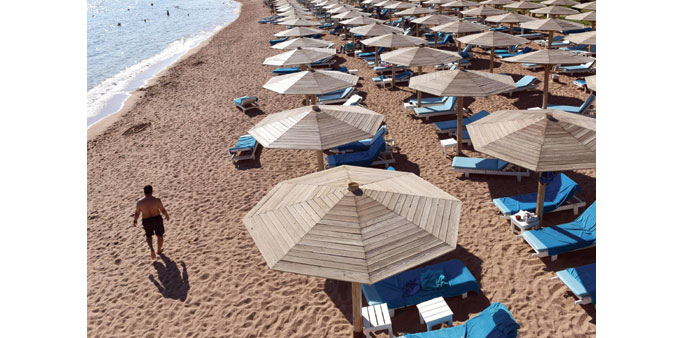A tourist walks past sunbeds on a beach in Egypt’s Red Sea resort of Sharm El Sheikh yesterday. As visitors stranded after the crash of a Russian airliner stream home from Egypt, Sharm El Sheikh is scrambling to keep its lucrative tourism sector alive.
As more governments believe that a bomb caused the Russian plane disaster over Sinai, Egyptian media outlets have reacted by denouncing a Western “conspiracy” aimed at harming its tourism industry.
Britain, Israel and sources close to the investigation say it was likely that a bomb caused the plane carrying mainly Russian holidaymakers to come apart in midair after taking off from the resort of Sharm El Sheikh, killing all 224 people on board.
The tragedy has led to potentially devastating flight restrictions for the tourism industry, a key revenue earner for Egypt’s beleaguered economy.
Cairo has said there is no “hypothesis” yet on the cause of the crash.
For some in the Egyptian media, however, the claims of a bomb and the travel restrictions are punishment against Egypt for its warm ties with Russia.
The state’s flagship newspaper Al Ahram ran a cartoon in which a man tells a youth: “What is happening now reminds me of the tripartite aggression in 1956,” referring to the French, British and Israeli invasion of Egypt.
“Of course,” responds the youth, who is wearing a T-shirt that says “I love Egypt”.
Another newspaper focused its ire on the British press in particular.
On its front page it ran a picture of a military boot stomping on the mastheads of the Independent, the Daily Mail and the Daily Telegraph.
Britain restricted flights to Sharm after the disaster on October 31, and its press has focused on security at the Red Sea resort’s airport.
London’s ambassador to Cairo, John Casson, has also come under fire in Egyptian newspapers.
The mass circulation Al Masry Al Youm headlined one article: “48 reasons to hate the British ambassador”.
He “mocks the Egyptians: he is not invited to celebrations and unwelcome at ceremonies. Boycott this ambassador”, it wrote.
Al Watan newspaper ran a story on negative comments on British Prime Minister David Cameron’s Facebook page, headlined “3,000 comments denounce the plot against Egypt”.
Another daily, Al Shorouk, headlined a story: “Britons in Luxor: we are ashamed at our government’s stance.”
Casson visited Sharm El Sheikh airport as British tourists were evacuated, and was filmed being rebuked by an angry holidaymaker who wanted to leave the country.
In Al Ahram, meanwhile, an opinion piece insisted that Egypt was the target of a plot because of improved relations between President Abdel Fattah al-Sisi and Russian President Vladimir Putin.
“It is a brazen attempt to punish Egypt economically and financially for many political reasons, especially the warming of ties between Egypt and Russia over the past three years,” Ashraf al-Ashmawy wrote.
Masry Al Youm underscored the point with a cartoon showing a scoreline in Sharm El Sheikh stadium: “America and England 1 - Russia 0”.
“It is a political and economic issue par excellence, aimed at taking revenge against Egypt and Russia together,” columnist Abdel Halim Qandeel wrote in the same newspaper.
Meanwhile the press has also focused on the popular resort being safe, as television channels aired footage of tourists insisting they want to stay on until their holidays end.
Local media also launched appeals to Egyptians to visit the resort.
Egyptian media have often reacted to crisis by suggesting a foreign plot, and the government itself has not been above citing such conspiracy theories over the past few years.

